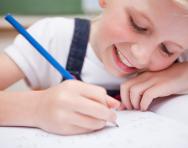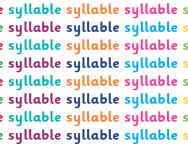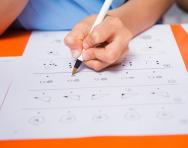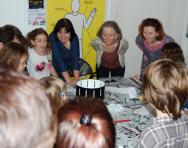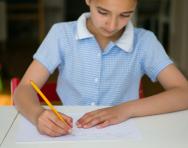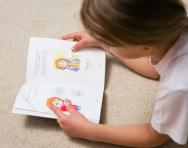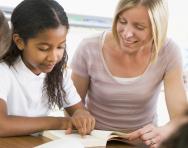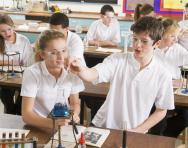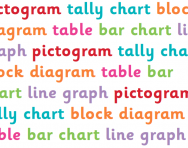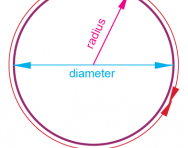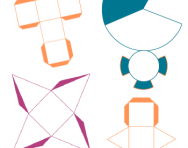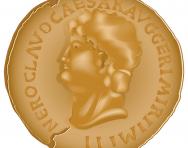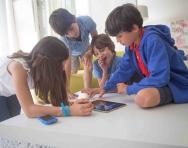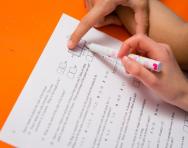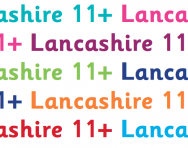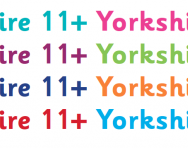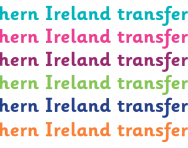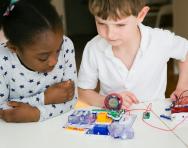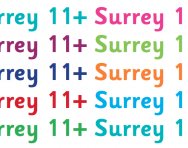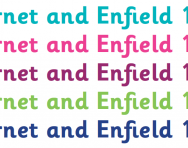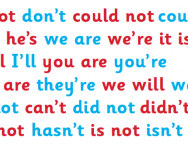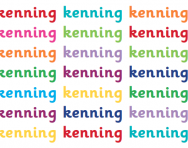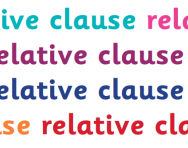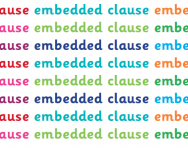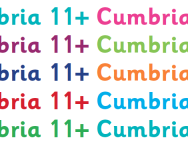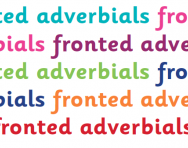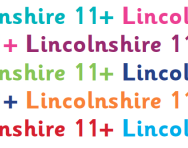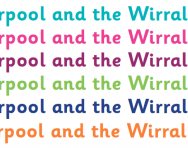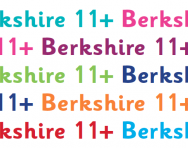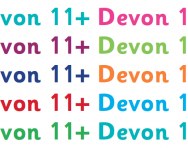Ks2 articles
Spelling in Year 3 and Year 4
From homophones to the use of prefixes and suffixes, spelling gets more technical in KS2. We explain what spelling patterns and rules your child will be introduced to in Year 3 and Year 4, and how you can support their learning with worksheets and activities at home.
What is a syllable?
Syllables explained for parents, including details of how primary-school children are taught to identify syllables to help them with spelling and reading and understanding poetry.
What are Common Entrance exams?
Common Entrance exams are the route to an independent senior school education for many children. We explain what’s involved.
Should you take your child to parents’ evening?
Does bringing your child to a parent-teacher meeting give them valuable input or get in the way of frank conversation? We discuss the pros, cons and practicalities.
Museums reviewed by parents: The Cartoon Museum, London
From Hogarth and Ronald Searle to Manga to favourite characters like Dennis the Menace, there’s something for all comic lovers at the Cartoon Museum in London. We visited to find out what's on offer for primary-school children and parents.
Top tips for the 11+ English writing task
In some areas, a piece of extended writing is an important component of the 11+. Tutor Anita Clemens explains the secrets of success.
The science of school reading schemes
Following a reading scheme at school can transform children from non-readers to bookworms in a surprisingly short space of time, but how are they developed and tested to help your child progress?
How to handle a disappointing parents' evening
No one likes to hear bad news at a parent-teacher meeting, but knowing how to respond could help your child turn the issue around. By Lucy Dimbylow.
What is an independent school?
Considering sending your child to a private school? We give you the lowdown on the independent education sector.
Secondary school induction days: what to expect
The transition from primary to secondary school is a big step for your child, but summer term induction days can help them to prepare for their new milestone. We explain how they work and what you (and your child) should expect.
Primary education in England, Wales, Scotland and N Ireland
We may be a United Kingdom, but schooling varies between each of our four countries. Our guide gives you an overview of the differences in primary school education in England, Wales, Scotland and Northern Ireland.
How being bilingual affects your child’s education
One in five primary school children speaks a language other than English at home. We find out how this affects their learning, and what schools (and parents!) can do to help.
What is data handling?
From pictograms to line graphs, children learn a lot about collecting, organising and presenting data in primary school maths. We explain how data handling is taught in KS1 and KS2 and how you can help your child get to grips with basic statistics at home.
What are equilateral, scalene, isosceles and right-angled triangles?
Children learn to classify triangles as equilateral, isosceles, scalene or right-angled in KS2 geometry. Our guide for parents explains everything you need to know about triangles in primary school, from working out the area to calculating the internal angles.
What are the parts of a circle?
By the end of KS2 children are expected to be able to identify the parts of a circle (circumference, radius and diameter) and begin to use formulae to calculate a circle's perimeter and area. We explain what parents need to know about this aspect of primary-school geometry.
What are nets of shapes?
Can you make a 3D shape from its net? We explain how nets are used in the primary classroom to help children learn more about three-dimensional shapes and their properties in a hands-on, constructive way.
What are Roman numerals?
Children in KS2 are expected to read and write Roman numerals as part of the primary curriculum. We explain how Roman numerals are introduced in the classroom and how you can help your child practise reading Roman numerals at home.
What is a fable?
Fables tell us a story and teach us a lesson at the same time and we've been hearing them, retelling them and writing them for over two thousand years. We explain how primary-school children learn about fables and Aesop in our guide for parents.
What is a traditional tale?
Traditional tales like Cinderella, Little Red Riding Hood and Goldilocks play an important part in early literacy. We explain how these well-known stories are used to help develop reading comprehension and early writing skills, and explain how you can help your child's learning with fairy tales at home.
Supporting your child at primary school if English isn’t your first language
Many parents find helping with school work challenging, and it can be even harder if you're not a native English speaker. So how can you help your child to do their best?
Best coding toys for children
Turn screen time into a super-powered learning experience with a new generation of coding toys. Your child will learn programming skills as they play, as well as the basics of computational thinking (and hopefully how to fix your IT problems, too!). We asked programmer, tech-expert and mum, Claire Wardle, as well as other parents, to put the toys to the test and share their findings.
GL Assessment 11+ tests explained for parents
It’s one of the main developers of grammar school entrance exams in the UK, but what do GL Assessment’s 11+ tests involve?
Best chemistry sets for children
Introduce your child to the world of chemical reactions, crystallisation and chromatography with the right chemistry set for every age and stage. From pre-schooler test tubes and safety goggles to pipettes of luminol and alcohol burners, we've picked great kids' chemistry sets for every budget and every budding chemist.
Taking the 11+ test in Lancashire
What's involved in the entrance assessment for Lancashire's grammar schools? We have the details.
The Yorkshire 11+ test explained
Yorkshire has six selective schools, split across three local authorities. Here's what you need to know about taking the entrance tests.
The Northern Ireland transfer test: Common Entrance Assessment (CEA)
Since the 11+ was discontinued in 2008, pupils in Northern Ireland have taken a transfer test for grammar school entry. We explain what's involved in the Post Primary Transfer Consortium test and the Common Entrance Assessment (CEA).
Best electronics sets for children
Learning how circuits work is an important part of Key Stage 2 science. Make the learning light up, buzz, ring and whizz up into the air with these brilliant electronics sets for children, designed to make exploring electricity creative and captivating. From sturdy sets suitable for small fingers to circuit-diagram projects, these sets offer a fantastic hands-on electrical education.
Taking the 11+ in Surrey
Surrey's grammar schools are some of the most competitive in the country. We have the facts you need to know about their entrance exams.
The 11+ in Barnet and Enfield
Competition is fierce for places at Barnet and Enfield's grammar schools, so what does the 11+ test involve?
What are contracted words or contractions?
Contracted words or contractions are used every day in spoken and written English. Help your child keep them straight with our parents' guide, including complete listings of the common contractions children learn to spell in Year 2 and throughout Key Stage 2.
What is a kenning?
Your child's KS2 poetry classes might include analysis of kennings, two-word phrases characteristic of Anglo-Saxon poetry. We explain what this literary device is and how your child might read and write kennings in the primary-school classroom.
What is an apostrophe?
Children are first introduced to apostrophes in Year 2. Help them practise punctuating correctly at home with our simple revision tips, covering the use of apostrophes for possession and omission.
What is a relative clause?
Relative clauses enrich sentences by offering extra information. We explain how to identify them in a sentence and offer tips to help parents support their child's grammatical understanding.
What is an embedded clause?
Understand and use embedded clauses with confidence with our plain-English parents' guide, including examples and details of how this aspect of sentence construction is taught in Key Stage 2 grammar.
Taking the 11+ test in Cumbria
With only one grammar school in Cumbria, we explain what you need to know about entering your child for the entrance test.
What are fronted adverbials?
Fronted adverbials, words or phrases that describe the action in a sentence, are introduced to KS2 children in Year 4. Find out how to identify them and how your child will be taught to use fronted adverbials in their writing in our parents' guide to primary grammar concepts.
The Lincolnshire 11+ test explained
With a massive 15 selective schools to choose from, what do you need to know about registering your child for the Lincolnshire 11+?
Taking the 11+ in Liverpool and the Wirral
The Liverpool and Wirral areas have 10 schools that are fully or partially selective. We explain their testing arrangements.
The 11+ test in Berkshire
All the facts you need to know about entering your child for the 11+ test for entrance to the Slough and Reading grammar schools.
11+ testing in Devon explained
With three separate Local Authorities involved, applying for a grammar school place in Devon can be challenging. We cut through the confusion and explain what parents need to know.
